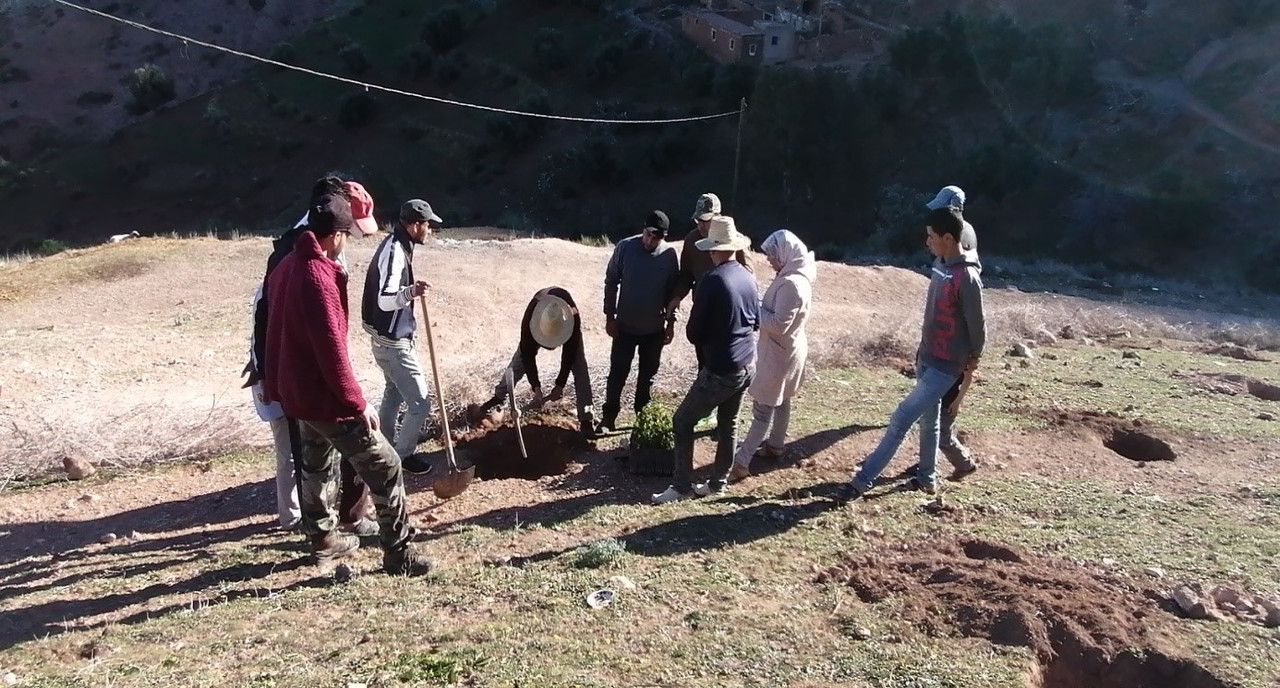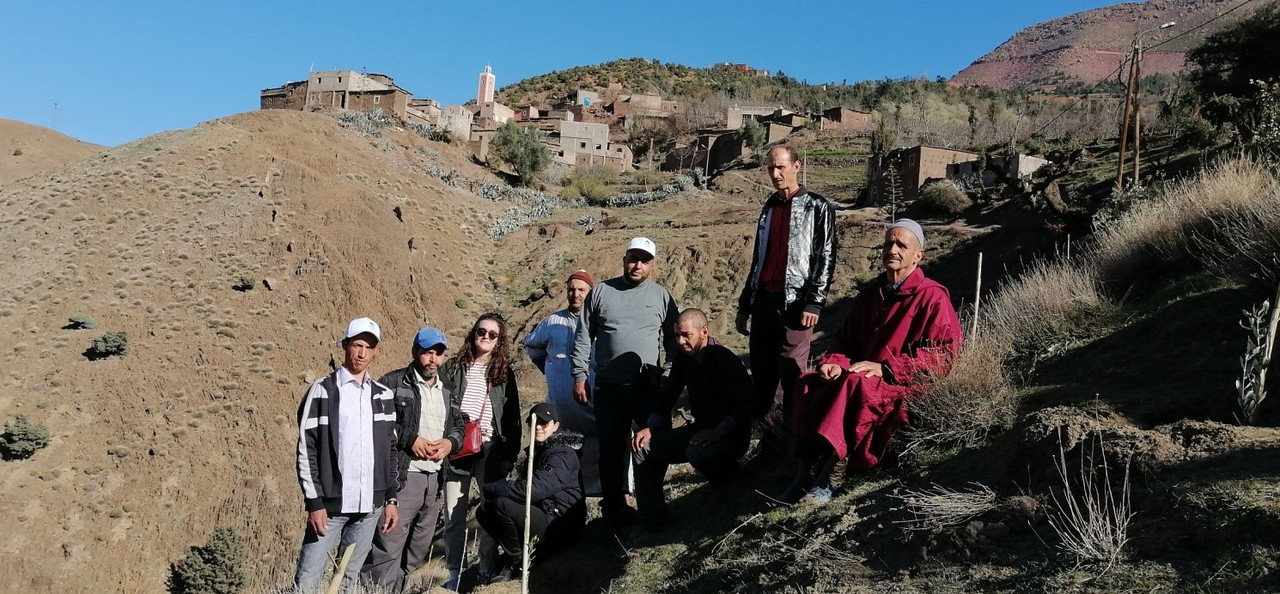At 8:30 on the morning of 5 February 2020, I met with High Atlas Foundation (HAF) staff member Amina and French volunteer Julie at the HAF headquarters; from there we took our backpacks full of notes, pens and sheets and walked for a couple of minutes, in order to get a cab towards a place in the Medina called Arset el Maach. We arrived in an area very dense with people trying to leave the city of Marrakech. Here we secured a larger vehicle with room for six to take us to Laagrab. On the way there, I noticed the shining sun and the crowded roadway, people hustling to go to work or to school by bike, car, bus, or on foot; all in all it was a good start to the day.
Shortly after 11:00, we arrived in Laagrab to meet Abdel-Jalil, with whom we shook hands and went off to our first planting site, following is old Mercedes. The road to Chaabat Talat Momoun in Ghmat Commune was full of curves and hills; despite my fears, we arrived safely at our venue and met with more men. The association’s well-educated president Abdel-Karim seems glad of the partnership with HAF and strengthened by his resilience to continue the work and seek knowledge for himself and his community.
Touring the site of the planned carob nursery, we saw magical views of the mountains up the hills and the trees that lie inside the deep forest. It was magnificent and a delight to be standing in front of that sight among HAF’s team. Abdel-Karim and his friends Karim and Hassan showed us the land where they are going to grow the carob trees. At this point, Julie and I were excited to join his staff in covering the carob seeds with dirt.
Before departing, Amina talked about how the HAF will cooperate with those farmers to plant 1,450 carob trees in the near future amidst almonds, walnuts, and many more. The farmers were overjoyed at this news because they have a strong desire to work with HAF, and they promised some very good cooperation in the future in order to bring bliss and contentment to their village and help many farmers grow these trees to earn a living.
The farmers were euphoric by the end of the planting, and thus Abdel-Karim honored us with a very special breakfast: butter, honey, cocoa, water and some tea. At the same time, we spoke about the influence of being illiterate in the rural areas, how planting trees changes some people’s vision about villages, how nowadays they want their girls to continue their academic careers, but the most important thing was bringing up how much they want to work with HAF to help them fund additional equipment and learn better irrigation methods. HAF staff matched their excitement about the partnership, eager to work with these ambitious men in the future to help promote human development.

The road to the next stop, Ourika, was less treacherous and lit by the sun, so on the way to the village we saw camels, people who sell their traditional work by the roadside, and some tourists taking pictures and purchasing souvenirs. Julie was taking pictures during the whole, sensational trip.
After an hour drive, we arrived at the site. Climbing rocks in the mountains, we met some women, including the village association president, Malika, and her associate secretary, Fatiha, who welcomed us and introduced us to the other eleven women. This association in fact was created by HAF in June 2019, and, after learning the craft, they took their degrees to manage this association four months later, calling it “The Participatory Approach with Cooperative Women and Women of Jaaman Atamar.” This cooperative decided at that time to make some cereal, caramel, and medicinal herbs local to their region. While they found it hard at first, step by step they learned the ropes of this craft and started working and also making couscous with different spices. Malika said, “We are very much content and there’s a lot of progress. Therefore, we now find it easy to make new crafts, plus we try to move forward and promote the association to the other villages and communities because it be very helpful to us.”
Clearly, it is a very small structure at the top of the mountain, but they are very satisfied. Moreover, I asked Malika whether the number of her staff is enough, and she confirmed that it is, saying, “These women are happy.” During this discussion, they served tea, black olives, bread, boiled eggs and Badger. They were very welcoming and engaging, their words translated for us from Tamazight, keeping the HAF staff very busy.
Amina requested that the women think of any suggestions in order to promote their association, for HAF works with both men and women for the greater good of the communities – and these women seem resilient, hardworking and very reliable. We learned that many of the issues that women face are
- how to promote their products and deal with the customers;
- an insufficient stock of production equipment and packaging;
- insufficient space for beekeeping to cultivate more honey; and
- limited water to grow aromatic and medicinal herbs.
In addition, the women find themselves at a crossroads where they need a headquarters to manage their business and training in how to deal with their clients and boost their products for themselves, their families and their communities. At the end, the women served us a very delicious tajine with potatoes and olives. There were hugs and kisses before we left, and we wished them the best before departing.
Our next site was a mere five-minute drive to Sidi Ali Afaress, where they plant diverse trees, such as: almonds, olives, carob, and pomegranate. HAF’s dream is to plant 6,000 trees in this village to spare this commune from poverty and provide drinkable water.

In conclusion, Imane stated at the end of this noteworthy day:
“This association is HAF’s number one; the farmers are extremely active, collaborative, on time, resilient, and determined to drive this association forward. They desire more trees from HAF, and we will supply even more to this village because it has earned extra support and assistance to recognize their marked advance and evolution. I’m immensely blissful.”